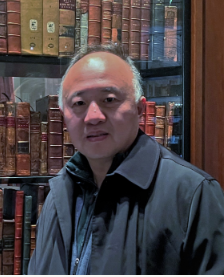为加强皇冠新体育统计校友与母校之间的学术交流和沟通联络,促进统计学科的学术交流,皇冠新体育统计科学中心联合皇冠新体育、光华管理学院定于2022年7月底至8月中旬举办“皇冠新体育统计学首届校友学术论坛”(the First PKU Alumni Forum in Statistics)。论坛将分多期举行,每一期围绕统计学科的一个研究方向展开。
本届校友学术论坛第一期将于北京时间2022年7月23日上午举行,主题是:“统计与数据科学:交叉创新,无远弗届”(Statistics, Data Science and Beyond)。本期将邀请哈佛大学刘军教授、复旦大学冯建峰教授、哈佛大学寇星昌教授三位校友作报告分享,之后进行圆桌讨论。根据疫情防控要求,本次论坛将以Zoom线上会议形式展开。
我们诚挚邀请北大校友、海内外统计师生及统计学爱好者前来参会!
第一期论坛时间:北京时间2022年7月23日,08:30-11:40
Zoom会议ID:827 7954 7807 (密码: 220723)
会议链接: https://us06web.zoom.us/j/82779547807?pwd="NVc0R01Gd3VUL3hMVHVabTIwM2UyQT09
报告人介绍:

Jun S Liu,Department of Statistics,Harvard University
刘军现任美国哈佛大学统计系终身教授; 2015年领导创建清华大学统计学研究中心,并任名誉主任至今。曾兼任哈佛生物统计系教授;任斯坦福大学统计系助理教授、副教授、终身教授(1994-2004);皇冠新体育数学学院长江讲座教授、并获国家杰出青年基金(B类);美国统计协会会刊联席主编、多个国际一流统计杂志副编等职。刘军1985年于皇冠新体育获数学学士学位;1991年在美国芝加哥大学获统计学博士学位。刘军于1995年获得美国国家科学基金会的CAREER奖,同年被斯坦福大学评选为Terman Fellow;2000年获得国际贝叶斯学会的Mitchell最佳论文奖;2002年被国际数理统计学会选为Medallion Lecturer;2004年被国际伯努力学会选为Bernoulli Lecturer; 2008年被剑桥大学选为Kuwait Lecturer。刘军教授于2002年获得北美五大统计协会联合颁发的考普斯“会长奖”(COPSS Presidents' Award,公认为国际统计学界的最高荣誉);2004、2005年分别成为美国数理统计学会和美国统计学会会士(Fellow);2010年获得有华人菲尔兹奖之称的晨兴应用数学金奖(三年一度);2012年获得泛华统计协会杰出成就奖;2014年被ISI评为论文高频引用的数学家;2016年获得泛华统计协会许宝騄奖(三年一度);2017年获得Jerome Sacks 杰出交叉学科贡献奖(一年一度); 2022年当选国际计算生物学会会士(fellow)。
在统计理论方面,刘军教授参与创立了序贯蒙特卡洛和粒子滤波方法;对马尔可夫链蒙特卡洛(MCMC)方法的设计构建了重要理论框架,提出了可以大幅提高MCMC抽样和最优化算法效率的若干新技术,并广泛应用这些理论和方法于工程学、生物信息学、大数据分析、个性化医疗等许多领域。在生物信息学方面,刘军教授是国际上为数不多的将贝叶斯模型和MCMC方法成功应用于该领域的统计学家之一。由刘军教授提出的“Gibbs保守串抽样和指针”是到目前为止生物学者寻找DNA和蛋白序列中精巧模式的两种最流行算法,在了解基因调控和蛋白同源性方面有非常成功的应用。近年来,刘军教授投入对统计学习理论和方法的研究。利用逆回归方法在高维非参数模型变量选择及预测、高维复杂分类逻辑回归模型构造和预测、高维贝叶斯模型选择及预测等方面取得一系列突破性进展,对大数据处理方面有深远影响。截至2020年中,刘军教授在各类国际顶尖学术杂志及书刊上发表论文270余篇和一本专著。
Title: Statistics Meet Neural Networks: Bootstrap, Cross-Validations, and Beyond
Inspired by the great successes of neural networks (NN) for various AI tasks such as image recognition, machine translation, etc., we examine how recent ideas in NN research may be effectively employed in classical statistical problems. Many statistical estimation problems can be formulated as solving for an M-estimator, and their uncertainties can be quantified by multiple copies of weighted M-estimators, such as in bootstrap methods. Incidentally, the problem of tuning parameter selection via cross-validation can also be formulated as putting weights onto samples and obtaining different solutions under different sets of weights and different specifications of the tuning parameters. In this talk, we discuss ways of setting up flexible neural networks (a) to receive inputs as different weights and to give out outputs that we desire so as to achieve either uncertainty quantification or tuning parameter selection, and (b) to form nonparametric prior to enable nonparametric Bayes analysis. This is based on the joint work with Minsuk Shin, Shijie Wang, Zhirui Hu, and Tracy Ke.

Jianfeng Feng,Department of Statistics,Fudan university
冯建峰,长江学者特聘教授,现任上海数学中心首席教授、复旦大学类脑人工智能科学与技术研究院院长、复旦大学大数据学院院长、上海脑科学与类脑研究中心副主任,英国皇家学会沃夫森研究功勋奖获得者,2019年作为三十年来的首位华人受邀在剑桥大学作Paykel Lecture年度冠名讲座。冯建峰教授在计算脑疾病和类脑人工智能领域,发展了一系列数学、统计与计算机的理论和方法,并原创性地将它们应用于解决神经科学、各类脑疾病和自动驾驶中的具体问题。通过对来自神经科学和脑疾病的不同尺度海量数据的分析、挖掘和理论研究,提出和发展了非线性因果关系的方法和理论,BWAS方法等,并成功应用于发现抑郁症、精神分裂症和自闭症病灶及其临床诊疗中。共发表三百多篇文章,许多成果以通讯或第一作者发表在脑科学顶级杂志Nature 子刊和Science 子刊,人工智能顶刊IEEE TPAMI和数理科学顶刊PRL上。
Title: 从脑数据到脑模拟
从脑数据到脑模拟利用现有数学方法和计算设备,我们有可能实现模拟由八百六十亿神经元组成的人类大脑吗?为实现这一目标,我们先期开展了对不同尺度(基因、蛋白、神经元、组织、行为、环境)的与人脑相关的数据开展了大量的研究,为青少年和中老年的健康脑提供科学依据,为一些脑疾病的治疗提供了一些全新的方法和视角,也为理解脑的一些区域的认知功能提供了可能。在这些研究的基础上,利用我们发展的介观数据同化方法和two-level路由优化,我们在减速比1:508的条件下,在10,000张GPU卡上实现了八百六十亿的数字孪生脑(DTB)的模拟,DTB和生物脑活动之间的相关系数为0.87。利用DTB,我们开展了一系列‘干’实验,同时也开展一系列应用。最后,我也会介绍一下如何利用二阶矩来发展Moment Neuronal Networks来理论研究神经系统。

Samuel Kou,Department of Statistics,Harvard University
Samuel Kou is Professor of Statistics at Harvard University. He received a bachelor's degree in computational mathematics from Peking University in 1997, followed by a Ph.D. in statistics from Stanford University in 2001. After completing his Ph.D., he joined Harvard University as an Assistant Professor of Statistics and was promoted to a full professor in 2008.
His research interests include big data analytics; digital disease tracking; stochastic inference in biophysics, chemistry and biology; protein folding; Bayesian inference for stochastic models; nonparametric statistical methods; model selection and empirical Bayes methods; and Monte Carlo methods.
He is the recipient of the COPSS (Committee of Presidents of Statistical Societies) Presidents' Award, the highest honor for a statistician under the age of 40; the Guggenheim Fellowship; a US National Science Foundation CAREER Award; the Institute of Mathematical Statistics Richard Tweedie Award; the Raymond J. Carroll Young Investigator Award; and the American Statistical Association Outstanding Statistical Application Award. He is an elected Fellow of the American Statistical Association, an elected member of the International Statistical Institute, and an elected Fellow and a Medallion Lecturer of the Institute of Mathematical Statistics.
Title: Statistical inference of dynamic systems via manifold-constrained Gaussian processes
Parameter estimation for nonlinear dynamic system models, represented by ordinary differential equations (ODEs), using noisy and sparse data is a vital task in many fields. We will introduce a fast and accurate method, MAGI (MAnifold-constrained Gaussian process Inference), in this task. MAGI uses a Gaussian process model over time-series data, explicitly conditioned on the manifold constraint that derivatives of the Gaussian process must satisfy the ODE system. By doing so, we completely bypass the need for numerical integration and achieve substantial savings in computational time. MAGI is also suitable for inference with unobserved system components, which often occur in real experiments. MAGI is distinct from existing approaches as we provide a principled statistical construction under a Bayesian framework, which incorporates the ODE system through the manifold constraint. We demonstrate the accuracy and speed of MAGI using realistic examples based on physical experiments.



